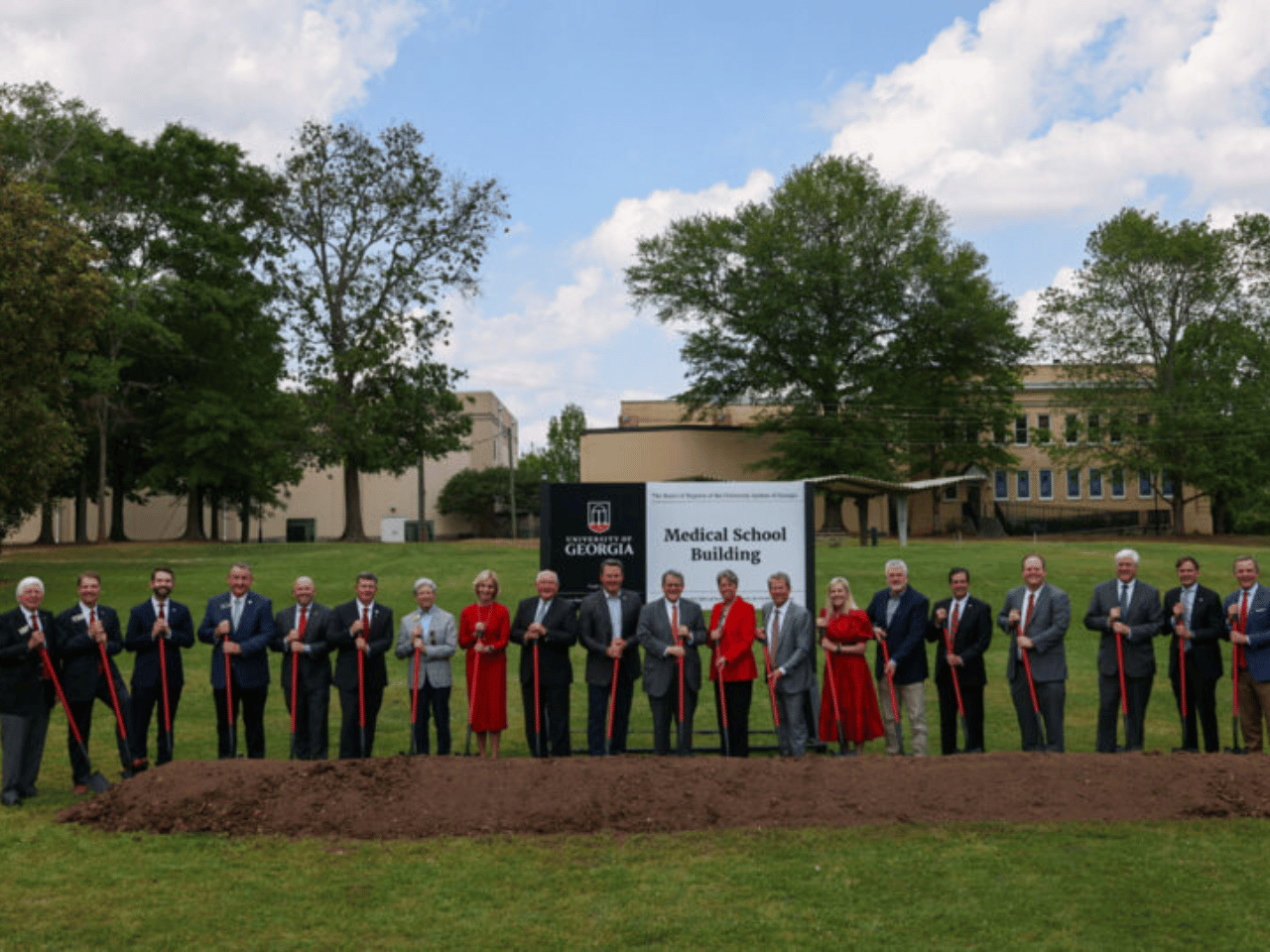The University of Georgia broke ground Friday on a new medical education and research building that will significantly expand teaching and research capabilities at the university’s future School of Medicine.
Located on UGA’s Health Sciences campus, preliminary plans for the building include medical simulation suites, standardized patient rooms, clinical skills labs, a gross anatomy lab, and a medical library. The building will also feature student support spaces like conference rooms, study spaces, lounges, and faculty and staff offices dedicated to student support.
In total, the proposed building will measure approximately 92,000 square feet. Roughly 67,000 square feet of the building will be dedicated to medical education while the remaining 25,000 square feet will house biomedical research laboratories.
The new building will complement existing facilities and provide the UGA School of Medicine with capacity to expand from 60 students per class to 120 in the future.
“Today is an exciting and transformational moment at the University of Georgia,” said UGA President Jere W. Morehead. “As a land-grant university and Georgia’s flagship research institution, the University of Georgia is uniquely positioned to address the health care needs of our state through world-class medical education, research and community outreach.”
Following the recommendation of Governor Brian Kemp, the Georgia General Assembly passed a fiscal year 2024 amended budget that includes $50 million in funding for a new University of Georgia School of Medicine facility.
The $50 million in state funding will be matched by private contributions to fund the $100 million medical education and research building.
The University System of Georgia Board of Regents authorized the University of Georgia to establish a new independent School of Medicine in Athens in February.
In March, Dr. Shelley Nuss was named founding dean of the UGA School of Medicine. She previously served as an associate professor of internal medicine and psychiatry in the Augusta University/University of Georgia Medical Partnership. In 2016, she was named campus dean of the Medical Partnership, which has been educating physicians in Athens since 2010.
“The fact is, Georgia needs more doctors, and we need them now,” said Nuss. “The new UGA School of Medicine will increase the number of medical students in the state, translating to more practicing physicians to help address Georgia’s greatest health care challenges.”
The creation of the UGA School of Medicine marks the natural evolution of the longest-serving medical partnership in the United States. Similar programs founded around the same time have already transitioned to independent medical schools.
UGA will continue to work closely with the Medical College of Georgia to ensure a smooth transition for current medical students as UGA seeks accreditation from the Liaison Committee on Medical Education (LCME).
The development of a new public school of medicine at UGA promises to help address a significant shortage of medical professionals. Georgia’s growing population tops approximately 11 million residents, straining the state’s existing medical infrastructure.
Now the nation’s eighth largest state, Georgia is forecasted to experience further population growth in the coming years, and nearly one-third of the state’s physicians are nearing retirement.
“Georgia is growing,” said Sonny Perdue, chancellor of the University System of Georgia. “We may only be only eighth today, but in just a few short years Georgia could be the fifth largest state. And that means we are going to need more health care, and people are going to get it here and across the state.”
Georgia currently ranks No. 40 among U.S. states for the number of active patient care physicians per capita, according to the Association of American Medical Colleges (AAMC), while it ranks No. 41 for the number of primary care physicians and No. 44 for the number of general surgeons per capita. The shortage of medical providers is particularly acute in rural and underserved areas, where access is even more limited.
UGA faculty are already engaged in human health research, and the establishment of a school of medicine will bolster their efforts.
“Our flagship institution, the University of Georgia, is tasked with the vital mission of educating and preparing the next generation of leaders,” said Gov. Brian Kemp. “To that end, one of our top priorities is building a strong health care workforce pipeline. This UGA facility will be an essential part of those efforts.”
Alongside funding from state government, strong private support will fortify efforts to create a School of Medicine at UGA. Donors have demonstrated robust support for UGA initiatives in recent years. In fiscal year 2023, UGA raised over $240 million in gifts and pledges from alumni, friends and foundation and industry partners. The university’s three-year rolling fundraising average is now a record $235 million per year, with annual contributions exceeding $200 million for the past six consecutive years.




